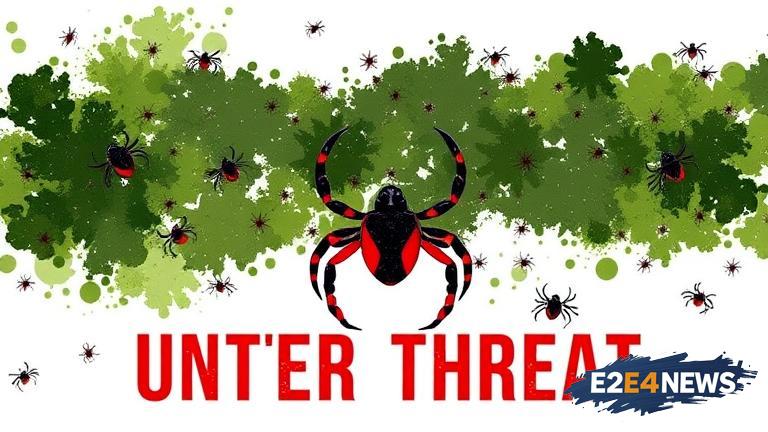The blacklegged tick, also known as the deer tick, has been steadily expanding its territory in recent years, and its presence has now been confirmed in Waterloo Region. This development has raised concerns among local health officials, who warn that the ticks can transmit a range of diseases, including Lyme disease, anaplasmosis, and babesiosis. The blacklegged tick is the primary vector of Lyme disease, which can cause symptoms such as fever, headache, and a distinctive rash. If left untreated, Lyme disease can lead to more severe health problems, including arthritis, neurological disorders, and heart problems. The ticks are typically found in wooded, bushy, and grassy areas, and are most active during the spring and summer months. They can attach themselves to humans and animals, feeding on their blood and potentially transmitting diseases. The Waterloo Region’s climate and geography make it an ideal habitat for the blacklegged tick, and officials are warning residents to take precautions to avoid tick bites. This includes wearing protective clothing, using insect repellents, and conducting regular tick checks after spending time outdoors. Pet owners are also advised to take steps to protect their animals from tick bites, as they can also transmit diseases. The spread of blacklegged ticks into Waterloo Region is a significant concern, as it can have a major impact on public health and the local ecosystem. The ticks can also affect wildlife, such as deer and birds, which can help to spread the ticks to new areas. Health officials are working to educate the public about the risks associated with blacklegged ticks and the importance of taking preventative measures. They are also conducting surveillance and monitoring efforts to track the spread of the ticks and identify areas of high risk. Residents are encouraged to report any tick sightings or bites to the local health authorities, which can help to inform public health policy and prevention efforts. The invasion of blacklegged ticks into Waterloo Region is a reminder of the importance of being aware of the risks associated with outdoor activities and taking steps to protect oneself and one’s community. By working together, residents and health officials can help to mitigate the impact of the blacklegged tick and prevent the spread of tick-borne diseases. The presence of blacklegged ticks in Waterloo Region is a significant public health concern, and it requires a coordinated response from local authorities, healthcare providers, and the community. The region’s residents are advised to be vigilant and take precautions to avoid tick bites, as the risks associated with tick-borne diseases are very real. The blacklegged tick is a serious health threat, and it requires a proactive and preventative approach to mitigate its impact. By taking the necessary precautions and working together, Waterloo Region can reduce the risks associated with blacklegged ticks and protect the health and well-being of its residents. The spread of blacklegged ticks into Waterloo Region is a wake-up call for the community, and it highlights the importance of being aware of the risks associated with outdoor activities and taking steps to protect oneself and one’s community. The region’s health officials are working tirelessly to educate the public and prevent the spread of tick-borne diseases, and residents are encouraged to support these efforts by taking precautions and reporting any tick sightings or bites. The blacklegged tick is a significant threat to public health, and it requires a coordinated and proactive response to mitigate its impact. The Waterloo Region’s residents are advised to be aware of the risks associated with tick-borne diseases and take the necessary precautions to protect themselves and their community.
